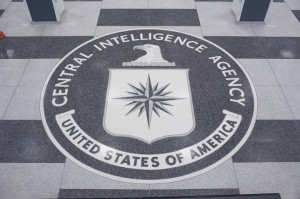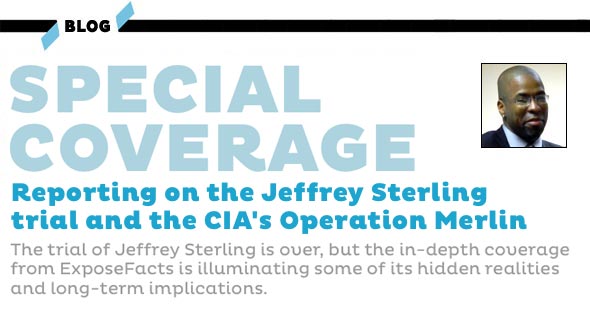 While the jury will likely neither note nor learn of them, there were details from last week’s testimony in the Jeffrey Sterling trial that resonated with two other notable cases involving the CIA: the New York Police Department’s spying on Muslims and the leak of Valerie Plame Wilson’s identity.
While the jury will likely neither note nor learn of them, there were details from last week’s testimony in the Jeffrey Sterling trial that resonated with two other notable cases involving the CIA: the New York Police Department’s spying on Muslims and the leak of Valerie Plame Wilson’s identity.
Intelligence, race, and religion in New York City
On Friday, former high ranking CIA officer David Cohen — who headed up the New York office while Sterling was there — described how he removed Sterling from the Merlin case because he didn’t believe Sterling was performing well at his job (an opinion neither his deputy, Charles Seidel, nor Bob S shared, at least according to their testimony). “His performance was extremely sub-par,” Cohen testified. Cohen also seemed to disdain what might be called political correctness, which if true may have exacerbated Sterling’s increasing sense of being discriminated against for being African American.
That would be consistent with the action for which Cohen has received more press in recent years: setting up the New York Police Department’s intelligence program that profiles the area’s Muslim community. In the wake of 9/11, Cohen moved from the CIA to the NYPD. In 2002, he got a federal court to relax the Handschu guidelines, which had been set up in 1985 in response to NYPD’s targeting of people for their political speech. Handschu required specific evidence before using informants to investigate a group. But, as an article from the Pulitzer Prize winning AP series described it, “Cohen told a federal judge that those guidelines made it ‘virtually impossible’ to detect terrorist plots.” After getting the rules relaxed, Cohen created teams of informants that infiltrated mosques and had officers catalog Muslim-owned restaurants, shops, and even schools. “Cohen said he wanted the squad to ‘rake the coals, looking for hot spots,'” the AP reported in 2011.
At almost precisely the same time as jury selection for Sterling’s case started, the Third Circuit Court of Appeals heard a challenge from those targeted under the program, who claim they had been discriminated against on the basis of their religion.
While the agencies involved are different, it seems notable that the primary person to find fault with Sterling’s performance at the CIA — which Sterling claimed arose from problems with his race — is the same guy who started a program targeting Muslims across the New York City area. But that detail won’t be presented to jurors at all during the trial.
CIA’s identity crisis
Also on Friday, CIA witnesses explained how they informed the Russian tasked with handing off blueprints to Iran (who has been called Merlin at the trial) and his wife that the operation had been exposed in James Risen’s State of War. At the same time, two cables recounting those January 2006 meetings were entered into evidence. On January 4, 2006, when Bob S first alerted the Merlins about the compromise, they “took the news surprisingly well,” even after Bob S told them the book included “multiple distortions … including unflattering comments about” Merlin which Bob S’ other testimony made clear in fact represented the CIA’s real opinion of Merlin’s difficult personality. That detail raises a question: if the CIA lied to Merlin about what was distorted in Risen’s book, are they telling the truth about what is inaccurate to the jury?
At a meeting on January 20, 2006 after the Merlins read the book themselves, however, they grew more concerned, both about the “several lies about [Merlin] presented as facts” and that the Russians and Iranians would be able to identify them (though the Iranians probably could have figured out who Merlin was from his letter, which included many of the same details as did Risen’s book). Of particular note, Merlin expressed concern that “the U.S. media ultimately will publish his name as they did with the [case officer] spouse of a former U.S. Ambassador,” according to the cable recounting the meeting, a clear reference to Valerie Plame Wilson, whose identity was leaked to several journalists in July 2003.
The Merlins’ concern demonstrates the real impact when CIA’s officers and assets are disclosed, via whatever means. It leads to doubts among other possible assets they can be protected.
That said, just two weeks after the second meeting that January 2006, court documents disclosed the first hints that Scooter Libby had testified his superiors — Vice President Dick Cheney and President George Bush — had ordered him to leak classified information, possibly including Plame’s identity, to New York Times reporter Judy Miller. Yet when Condoleezza Rice testified under oath last Thursday that President Bush had taken this leak very seriously, she didn’t mention that he had also commuted the sentence of the man — Libby — who had obstructed an investigation into determining whether Cheney had ordered one of Sterling’s former colleagues in the counterproliferation division to be compromised. Thus far, the circumstantial evidence against Cheney is stronger than that against Sterling, yet more evidence of the selective prosecution of various leakers.
Jurors are unlikely to make this connection unless they read the cable closely and make the connection to Plame’s case. And in any case, the jurors are not weighing in on the selective prosecutions and discrimination involving the CIA; they will only weigh whether the government has enough evidence to find Sterling guilty of leaking details of Operation Merlin.
Yet that larger context remains important for understanding the pursuit of leaks.

